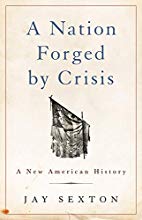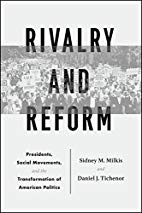Publications by former RAI fellows
The time which RAI Fellows spend at the Institute often results in books and articles which appear some time later. The RAI congratulates the following authors on their latest publications.

Jay Sexton, A Nation Forged by Crisis: A New American History (Basic Books, January 2019). A Nation Forged by Crisis presents a concise history of America for our time. Jay Sexton contends that the U.S. national narrative has been punctuated from the start by underappreciated moments of disruption, and that the roots of these disruptions can be traced to shifts in the international system. Sexton shows that the Revolution was not the inevitable result of American exceptionalism, but a consequence of Atlantic integration. By the 1760s, immigration to the colonies had spiked, and among the new arrivals were people like Thomas Paine who brought radical ideas to the continent. While Sexton does not dispute that the Civil War was caused by slavery, he argues that a necessary precondition for the conflict was the absence, for the first time in decades, of foreign threats. Both North and South were emboldened, with horrific results. In a similar way, it is impossible to understand the emergence of the New Deal without examining the role of "white ethnics" – first and second generation Germans, Poles, and Irish – in transforming the mid-century Democratic Party. Sexton closes by suggesting that if recent developments are any indication, the politics of the future may look less like those of the twentieth century than those of the nineteenth, which was dominated by questions of labour and race, markets and tariffs, immigration and citizenship, international rivalry and geopolitical instability. Jay Sexton is a former Director of the RAI and remains a Distinguished Fellow.

Sidney M. Milkis and Daniel J. Tichenor, Rivalry and Reform: Presidents, Social Movements, and the Transformation of American Politics (University of Chicago Press, 2018). Rivalry and Reform explores a relationship which has proved pivotal in changing the course of American politics: that between presidents and social movements. For all their differences, both have been driven by a desire to recast the political system, often pursuing rival agendas that set them on a collision course. During rare historical moments, however, they have forged partnerships that profoundly recast American politics. Sidney Milkis and Daniel Tichenor pursue this relationship throughout U.S. history and into the present day, revealing the patterns that emerge from the epic battles and uneasy partnerships that have profoundly shaped reform. Through a series of case studies, including Abraham Lincoln and abolitionism, Lyndon Johnson and the civil rights movement, and Ronald Reagan and the religious right, the authors argue that major political change usually reflects neither a top-down nor bottom-up strategy but a crucial interplay between the two. Savvy leaders, the authors show, use social movements to support their policy goals. At the same time, the most successful social movements target the president as either a source of powerful support or the centre of opposition. The book concludes with a consideration of Barack Obama’s approach to contemporary social movements such as Black Lives Matter, United We Dream, and Marriage Equality. Sidney Milkis was the John G. Winant Visiting Professor of American Government at the RAI and Balliol College during 2016-17.

Robert A. Scott, How University Boards Work: A Guide for Trustees, Officers, and Leaders in Higher Education (Johns Hopkins UP, 2018). How University Boards Work draws on the author’s personal experience as President of Ramapo College of New Jersey (1985-2000) and Adelphi University (2000-2015) to help trustees understand how to fulfil their responsibilities. While college and university trustees are expected to hire the president, advise senior staff, manage investments and financial decisions, and oversee major strategic initiatives, they sometimes come into this powerful role with little or no understanding of what they are meant to do or how their institutions work. In this concise manual, Robert A. Scott offers guidance on the difference between governance and management, advice on how best to prepare for board decisions and discussions, examples of positive and negative board behaviour, recommendations on board professional development, and advice on managing transitions between chief executives. The book will prove a valuable resource for those responsible for governing colleges and universities, whether privately financed or state-funded. It will also be of interest to board secretaries, campus executives and administrators, faculty leaders, alumni volunteers, and public officials, as well as anybody seeking to understand institutional governance in the light of past and current trends in U.S. higher education. Robert A. Scott was Senior Visiting Research Fellow at the RAI in 2015-16.



